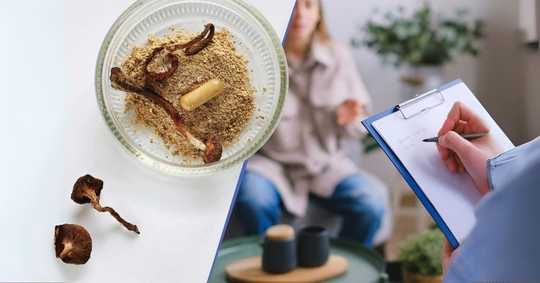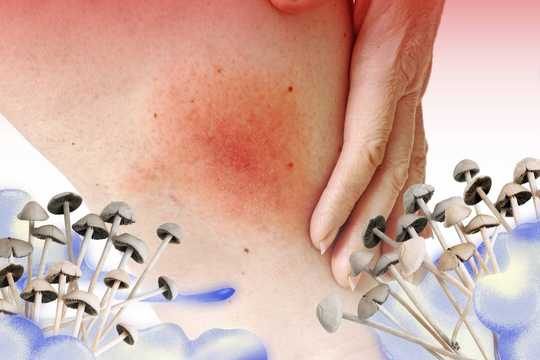If you’ve seen ‘How to Change Your Mind, one of several Vice documentaries, or a certain episode of Goop, you know psychedelic retreats are out there. They’re one of the few ways to legally access substances like psilocybin, MDMA, and ibogaine. Maybe you’re curious about enrolling in one yourself. Here are 5 essential things to know before you book a psychedelic retreat.
Psychedelic Support believes in the evidence-based practice of psychedelic therapy. Our focus is on legal access. The paradigm of legalized psychedelic therapy is emerging before our eyes, and we’re excited to see new options.
But we also know that psychedelics may represent a life-changing intervention for many people with mental illness. These people may not have to suffer while awaiting FDA approval. They may feel like a retreat is their best option compared to more prescriptions and therapy. Many people come to psychedelic medicine after being disappointed with conventional treatment methods.
Psychedelic therapy is showing to be effective for a range of mental health diagnoses, like. . .
- Ketamine and Psilocybin for treatment-resistant depression
- MDMA for treatment-resistant PTSD
- Ibogaine for addiction
People who have lived with these conditions for years or decades may feel desperate. They may be searching for an answer outside of current FDA approval.
If you’re interested in a psychedelic retreat, we want you to have safe access. There can be risks associated with psychedelic experiences. And because these retreats are not held to any standards, it’s up to you to choose the right one. Here are 5 essential things to know before you book a psychedelic retreat.
Psychedelic retreats are just one way to access psychedelic therapy. Check out our blog on legal ways to get psychedelics in 2022.
1. Principles of Psychedelic Safety at Retreats
Know how to keep yourself and your friends safe.
A psychedelic experience can be healing. It may help reveal more about ourselves than we thought possible. These substances help us open up to new experiences and ideas – like spirituality and ego-death. Psychedelics’ dream-like effects put people into a state of suggestibility. This state can make people vulnerable to assault and abuse.
Going to a psychedelic retreat can put you into a power differential. You’re in a new place, undergoing a new experience, typically around people you’ve only known for a few days. Under these circumstances, people have been harmed during their psychedelic sessions.
To avoid this, look up reviews on your facilitators. Have other people you know done a psychedelic retreat? Is there someone you can go to for recommendations on safe facilities?
Proper vetting and research can help you be sure you’re getting the experience you want.
When you arm yourself with the principles of harm reduction, you make you and your friends safer. Access our guide to psychedelic harm reduction on our free courses page.
2. The Legality of Psychedelic Retreats
Wherever you plan on going, know the laws governing psychedelics there. Don’t try to transport psychedelics across national or state lines.
Psychedelics exist in a gray area in many countries. Specific psychedelics are fully legalized in a few – the Netherlands, Jamaica, the Bahamas, and Brazil. In others, they’re not technically legal, but decriminalized or unregulated. Violating international laws may get you into a difficult situation if you’re caught. And consequences can range from a slap on the wrist to jail time.
It’s now possible to experience psychedelic retreats within the states, though. Michigan, Colorado, and California all have cities where psychedelics have been decriminalized. This paves the way for folks who aren’t not comfortable leaving the country but don’t mind driving a few states over. And these retreats may be safer since they are less remote than ones abroad.
Now you’re aware of the legal risk you may take on a psychedelic retreat. Next, is evaluating the professionals administering your psychedelic therapy.
3. Know Your Providers
Get clear on who is offering your psychedelic retreat, their background, and credentials.
Psychedelic retreats are hosted in countries where the bounds of licensure and FDA approval don’t apply. This opens the field up to mystic leaders and shamans. One or a few people lead many small retreats. These people may have expertise, but they don’t need to achieve a standardized level of education to practice.
Spiritual leaders have an essential place in psychedelic therapy. But under our model, they’re part of a co-therapy team that includes…
- Medical supervisors
- Nurses
- Facilitators
- Therapists
This system ensures patient safety. The Co-Therapy team helps participants have the best medical and spiritual support. Psychedelic therapy also requires integration with a trained therapist and supervision from a medical provider. Ask yourself these questions while planning your retreat:
- Will a therapist be present afterward to help you process your experience?
- Will you need to arrange for therapy once you get back home?
- Who will be managing your medications during the retreat?
These questions help you ensure that you’re getting the proper coordination of care during your experience.
Psychedelic trauma is rare, but it can happen. When a patient isn’t prepped properly for therapy, or a facilitator isn’t able to make them feel safe – patients can internalize their psychedelic experience as negative and hurtful. In a controlled environment, like clinical trials, this is rare to nonexistent.1 But it’s important to keep in mind when you’re shopping for a psychedelic retreat.
With that in mind, do you have a specific substance in mind for your retreat? Different substances have wildly different standards for dosages. Let’s talk about what dosage you can expect from your psychedelic retreat.
4. Know Dosage, Set, and Setting
Know what you’re taking, how much you’re getting, and how long you can expect the experience to last. You should also be familiar with your environment and the people around you.
Take a look at these dosage ranges for the most common psychedelics:
- Ketamine: 0.5 mg/kg of body weight, given through an IV twice a week.2 Intranasal doses of esketamine are titrated via an inhaler, starting at 56mg and going up to 84mg.3 Ketamine experiences typically last about an hour.
- Psilocybin: 30 mg/70kg of body weight is most supported in trials (pure psilocybin, not mushrooms by weight), with effects lasting 3-6 hours.4 Keep in mind that different mushrooms contain different concentrations of psilocybin. Ask your guide which type of mushroom you’ll be using, and what dosage they plan on using.
- MDMA: trials are currently using dosage between 75-125mg, with experiences peaking at 2 hours and lasting about 8 hours.5
- LSD: trials are using dosages between 50-200 micrograms (LSD is very potent), with experiences lasting up to 12 hours.6
- Ayahuasca: trials use doses between 0.5-1.0mg/kg of body weight. Experiences peak between 1 and 1.5 hours after taking ayahuasca, with the experience fully resolved about 4 hours after ingestion.7
- Ibogaine: Doses range between 100-1000mg.8 Ibogaine’s active period is much longer than other psychedelics, ranging from 24-48 hours.9
Psychedelics demand that we be our own guide. Be sure you understand which substance you’ll be getting, how much, and under what circumstances.
Set and setting also affect your experience and your outcomes. This includes the other people with you on the retreat, where you’ll be staying, the food you’ll be eating, and more. Your facilitator should prepare you for what to expect during your retreat.
But your retreat providers won’t be managing your health outcomes in the long term. Your primary care doctor or psychiatrist should also be aware of your plans to pursue psychedelic therapy.
5. Tell Your Doctor – No, Really
Make sure your at-home doctors are aware of the medications you’re taking, when you’re going, and what substances you’ll be using.
Many people think of psychedelics as purely spiritual, but they also have medical effects. Some prescriptions affect the psychedelic experience, and vice-versa. And if something goes wrong, it’s important that your doctor knows your history.
Similarly, your retreat’s medical supervisor will need to see what medications and supplements you’re taking. They’ll also want to know about your medical and mental health history. Being transparent with your retreat’s facilitators will give you the best experience possible.
Psst. . . our speakers have some hot takes on managing SSRIs during psychedelic retreats. See our chat with Dr. Erica Zelfand for more.
Final Takeaways If You’re Interested In a Psychedelic Retreat
We don’t want to scare you away from getting a treatment that could help you. Thousands of people go to psychedelic retreats every year. Outcomes haven’t been measured, but the growing industry leads us to believe that most people have good experiences. If you take these 5 steps to prepare for your psychedelic retreat, you could have a life-changing experience.
Are you looking for support before and after your psychedelic medicine retreats? Check out our extensive provider network. Wherever you are in your journey, connecting with our providers can help you gain knowledge, therapy supervision, build a co-therapy team, and more.
References
- Schlag, A. K., Aday, J., Salam, I., Neill, J. C., & Nutt, D. J. (2022). Adverse effects of psychedelics: From anecdotes and misinformation to systematic science. Journal of Psychopharmacology, 36(3), 258–272. https://doi.org/10.1177/02698811211069100
- Medscape. (2022, June 12). Ketalar (ketamine) dosing, indications, interactions, adverse effects, and more. Retrieved September 24, 2022, from https://reference.medscape.com/drug/ketalar-ketamine-343099
- Spravato (esketamine intranasal) dosing, indications, interactions, adverse effects, and more. (2020, August 7). Retrieved September 24, 2022, from https://reference.medscape.com/drug/spravato-esketamine-intranasal-1000325
- Li NX, Hu YR, Chen WN, Zhang B. Dose effect of psilocybin on primary and secondary depression: a preliminary systematic review and meta-analysis. J Affect Disord. 2022 Jan 1;296:26-34. doi: 10.1016/j.jad.2021.09.041. Epub 2021 Sep 17. PMID: 34587546.
- Study comparing three doses of MDMA along with therapy in veterans with posttraumatic stress disorder – full text view. Full-Text View – ClinicalTrials.gov. (n.d.). Retrieved September 24, 2022, from https://www.clinicaltrials.gov/ct2/show/NCT01211405
- Holze F, Vizeli P, Ley L, Müller F, Dolder P, Stocker M, Duthaler U, Varghese N, Eckert A, Borgwardt S, Liechti ME. Acute dose-dependent effects of lysergic acid diethylamide in a double-blind placebo-controlled study in healthy subjects. Neuropsychopharmacology. 2021 Feb;46(3):537-544. doi: 10.1038/s41386-020-00883-6. Epub 2020 Oct 15. PMID: 33059356; PMCID: PMC8027607.
- Riba, J., Rodríguez-Fornells, A., Urbano, G. et al. Subjective effects and tolerability of the South American psychoactive beverage Ayahuasca in healthy volunteers. Psychopharmacology 154, 85–95 (2001). https://doi.org/10.1007/s002130000606
- Mash, D. C., Duque, L., Page, B., & Allen-Ferdinand, K. (2018). Ibogaine detoxification transitions opioid and cocaine abusers between dependence and abstinence: Clinical observations and treatment outcomes. Frontiers in Pharmacology, 9. https://doi.org/10.3389/fphar.2018.00529
- Richer, E. (n.d.). Tabernanthe Iboga. Tabernanthe Iboga – an overview | ScienceDirect Topics. Retrieved September 24, 2022, from https://www.sciencedirect.com/topics/neuroscience/tabernanthe-iboga#:~:text=Due%20to%20the%20severe%20side,even%20up%20to%2048%20hours.






